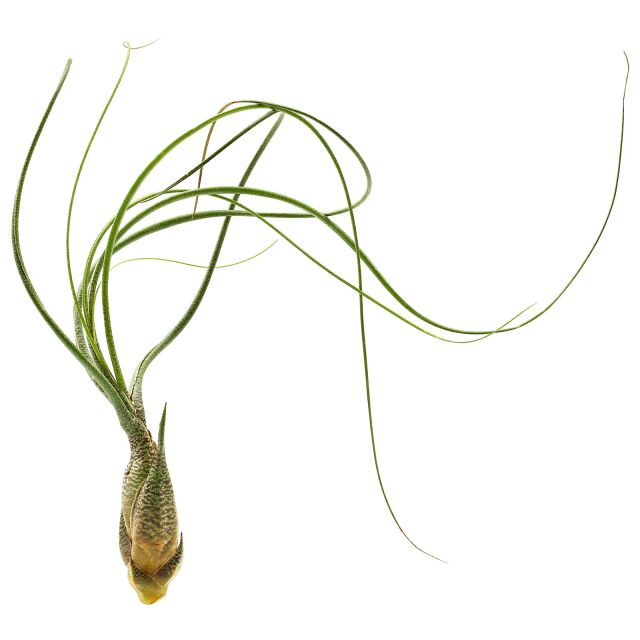Butz's air plant





Tillandsia butzii
Butz's air plant
- Rainforest Tillandsia from Central America
- Snake-like curved, thin leaves
- Widened rosette basis
Sign in or Register
Item question
We’re here for you!
Please enter your question and e-mail and we’ll contact you as soon as possible. It usually takes us up to 24 hours during business days to respond.
Thank you for your question!
Thank you, we’ll get in touch!
Close window
You already sent us a question.
Please wait a few minutes
Description
Tillandsia butzii is an interesting epiphyte that is widespread in the humid tropics of Central America, from central Mexico to Panama in elevations of approx. 1000 - 2000 m. Similar to Tillandsia caput-medusae and T. bulbosa, it has snakelike curved leaves and a conspicuously thickened rosette base (pseudobulb). This species is also a so-called myrmecophyte: in nature, symbiotic ants nest between the broadened leaf bases of the pseudobulb. In cultivation, however, ants are not necessary. The upper part of the leaves is hard, thin and rolled up on the side. When the plant comes into flower, it forms a slender inflorescence with blue-violet flowers in a spike.
Tillandsia butzii belongs to the green or rainforest Tillandsias, which prefer a more humid environment than the so-called grey tillandsias. Nevertheless, it is an "air plant" that can absorb water and nutrients completely via absorbent scales on the leaves. The roots serve mainly as adhesive roots. The plant is attached to a solid base such as wood or stone. The species likes a bright location, but without blazing midday sun if grown in daylight.
The plant should be watered regularly with soft water. This can be done by dipping as well as by misting. However, constant wetness between the leaf bases is not tolerated and the plant should be allowed to dry off between waterings. Ideally, an orchid and Tillandsia fertiliser should be added every second watering during spring and summer.
Like almost all Tillandsias, T. butzii also forms several daughter rosette at its base after flowering.
These pups can be carefully separated from the mother plant when they reach a size of about one third. If they are not separated, they grow together to form a larger clump.
The rather small to medium-sized Tillandsia butzii is an exceptional looking epiphyte suitable for rainforest terrariums.
Profile
| Tillandsia butzii | |
| Cultivation options | Epiphytic (tying on, sticking) |
| Growth height | approx. 12 - 30 cm |
| Temperature | approx. 20 - 28 °C |
| Humidity | At least 60 % |
| Light requirement | Semi-shade; no direct sun |
| Watering | Moderately, once a week by spraying or dipping with calcium-free water |
| Fertilising | In spring and summer, with every second watering, orchid or Tillandsia fertiliser |
| Propagation | Formation of pups after blooming |
| Suitable for | Rainforest terrariums, tropical mountain forest terrariums |
| Cultivation options |
| Epiphytic (tying on, sticking) |
| Growth height |
| approx. 12 - 30 cm |
| Temperature |
| approx. 20 - 28 °C |
| Humidity |
| At least 60 % |
| Light requirement |
| Semi-shade; no direct sun |
| Watering |
| Moderately, once a week by spraying or dipping with calcium-free water |
| Fertilising |
| In spring and summer, with every second watering, orchid or Tillandsia fertiliser |
| Propagation |
| Formation of pups after blooming |
| Suitable for |
| Rainforest terrariums, tropical mountain forest terrariums |
Terrarienpflanzen
Our terrarium plants give every terrarium an individual, natural atmosphere and at the same time provide a healthy environment for all terrarium inhabitants. Our wide range of tropical, subtropical and even arid plants are easy to combine and enhance any terrascape. Whether it's strong succulents, subtle tillandsias, eye-catching neoregelias or wonderful orchids - we offer terrarium plants for different terrascapes from rainforest to desert.
General information
| Item no. |
|
| EAN | |
| Weight | 0,01 kg |
| Shipping weight | 0,02 kg |
Customers ask customers
You have questions about this product? Ask other customer or our support team about this product!